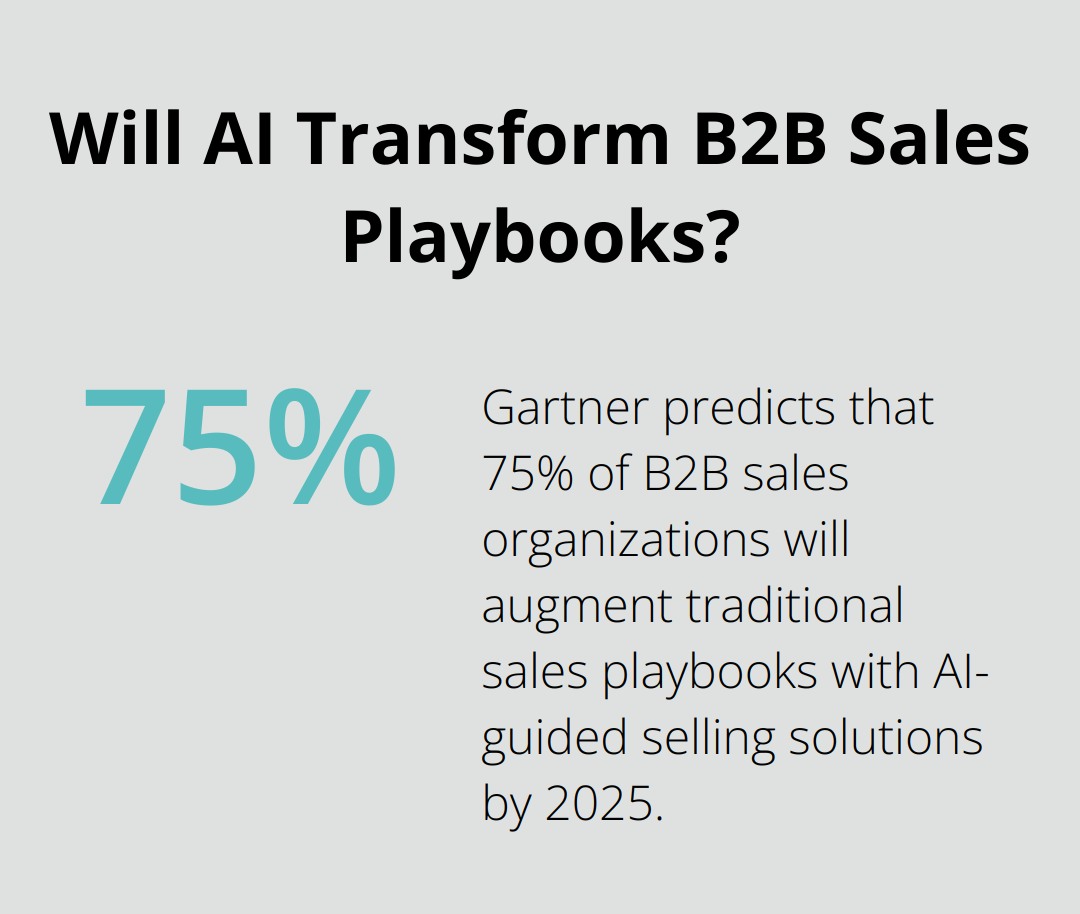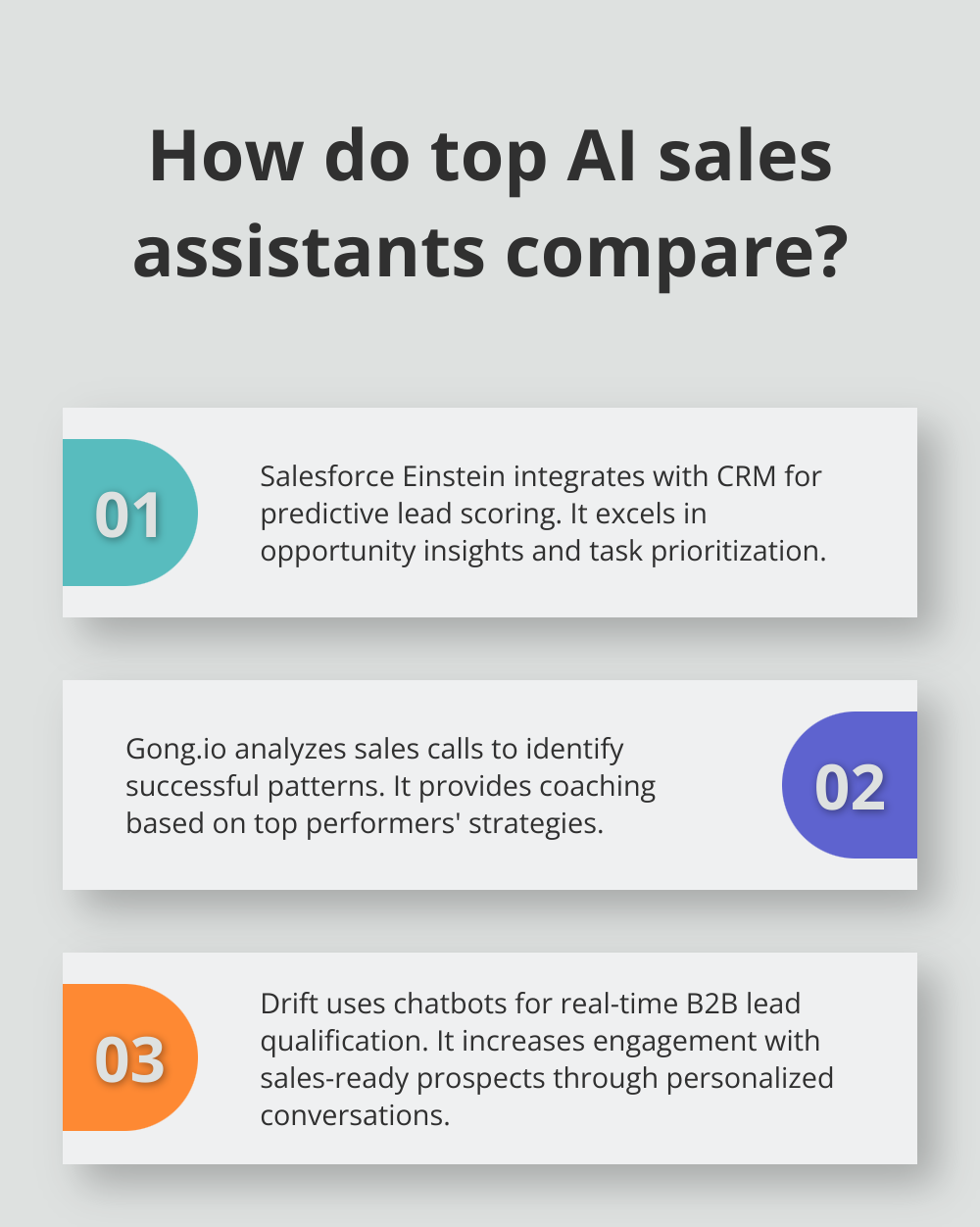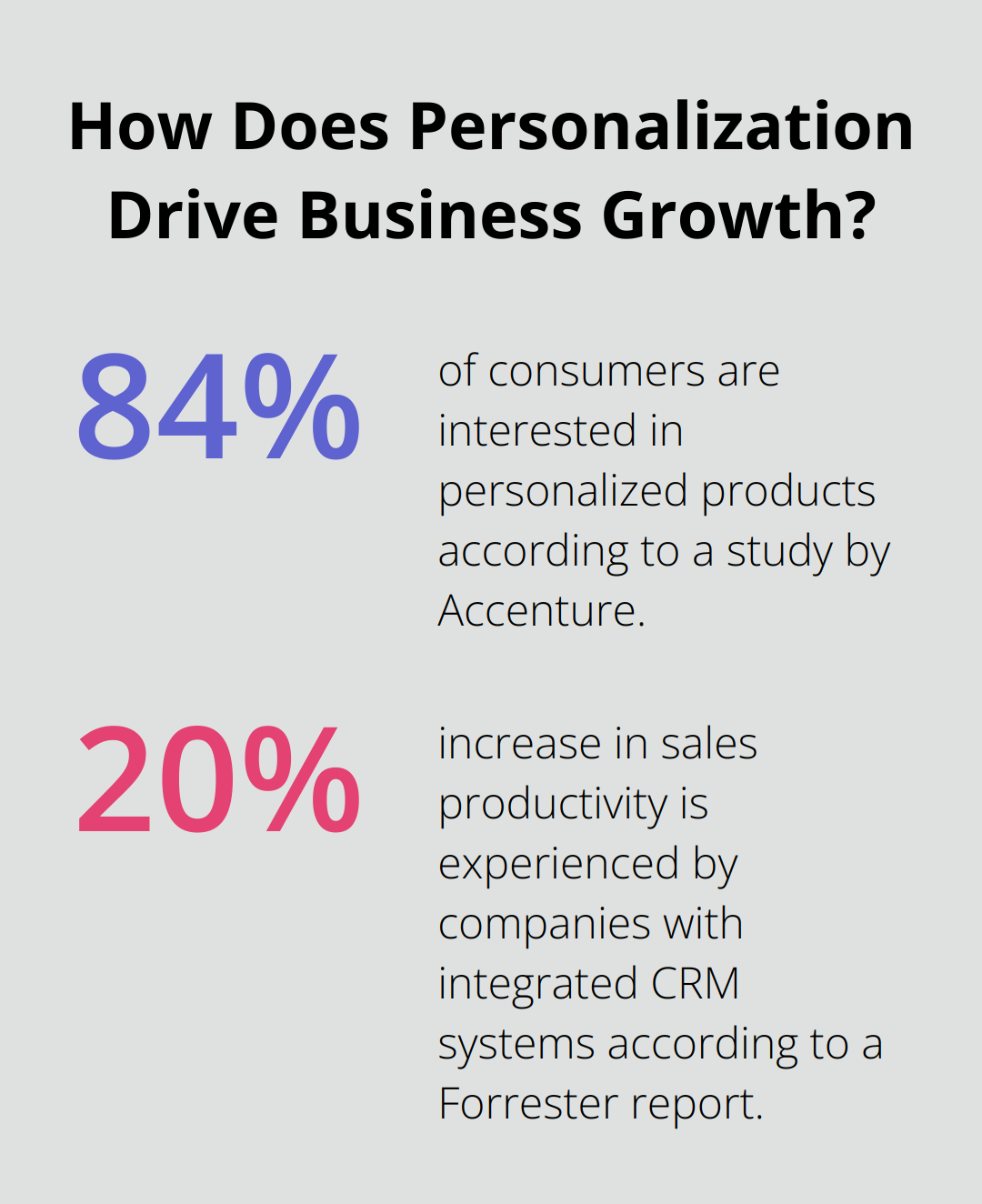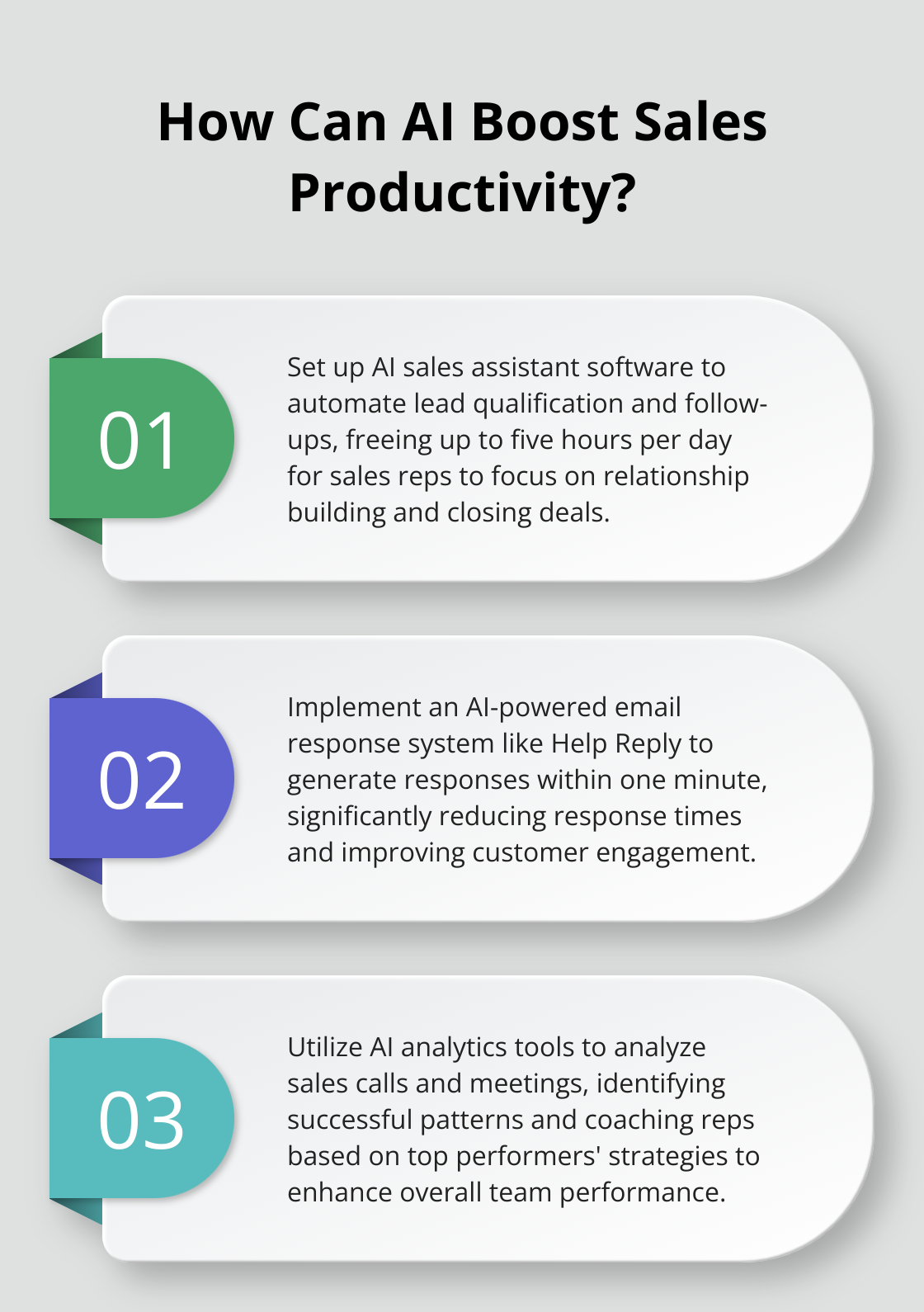AI sales assistant software is revolutionizing the way sales teams operate. These powerful tools are streamlining processes, enhancing customer interactions, and boosting overall performance.
At Help Reply, we’ve seen firsthand how AI-driven solutions are transforming the sales landscape. In this post, we’ll compare the top AI sales assistant software options to help you make an informed decision for your team.
What Is AI Sales Assistant Software?
Redefining Sales Processes
AI sales assistant software transforms sales team operations. These tools leverage artificial intelligence to automate and optimize various aspects of the sales process. At their core, AI sales assistants handle tasks like lead qualification, follow-ups, and data entry. This automation allows sales reps to concentrate on their primary strengths: building relationships and closing deals.
Efficiency and Performance Boost
The benefits of AI sales assistants are substantial. Sales teams using these tools experience significant time savings. A Salesforce study revealed that AI can save sales reps up to five hours per day on administrative tasks. This extra time translates to more customer interactions and, ultimately, increased sales.

Performance improvement extends beyond time savings. AI sales assistants analyze vast amounts of data to provide insights that humans might overlook. This analysis leads to more accurate sales forecasting and improved decision-making.
Personalization at Scale
One of the most powerful features of AI sales assistants is their ability to personalize interactions for large customer bases. They analyze customer data and behavior to tailor communications for each prospect. This level of personalization was once only feasible with small customer groups. Now, even large enterprises can provide personalized experiences to thousands of customers simultaneously.
Market Adoption Surge
The adoption of AI sales assistants is skyrocketing. Gartner predicts that by 2025, 75% of B2B sales organizations will augment traditional sales playbooks with AI-guided selling solutions. This rapid adoption stems from the clear ROI these tools provide.
Evolving Capabilities
As the market for AI sales assistants grows, new features and capabilities emerge. Natural language processing becomes more sophisticated, allowing for more natural interactions between AI and customers. Predictive analytics improve at identifying high-potential leads. Integration capabilities expand, enabling AI sales assistants to work seamlessly with a wider range of tools and platforms.
The landscape of AI sales assistant software continues to evolve rapidly. In the next section, we’ll explore some of the top solutions in this space, including Help Reply, and compare their unique features and benefits.
Which AI Sales Assistants Lead the Pack?
Salesforce Einstein: The CRM Giant’s AI Powerhouse
Salesforce Einstein is a layer of intelligence added to their CRM (Customer Relationship Management) software. It excels in predictive lead scoring, opportunity insights, and automated task prioritization. Its strength lies in its seamless integration with existing Salesforce workflows, which makes adoption smoother for teams already using the CRM.
Gong.io: Conversation Intelligence Master
Gong.io specializes in analyzing sales calls and meetings. It transcribes, records, and analyzes customer interactions to provide actionable insights. Its ability to identify successful sales patterns and coach reps based on top performers’ strategies sets it apart.
Drift: Conversational Marketing Pioneer
Drift focuses on real-time engagement through chatbots and conversational AI. It’s particularly effective for B2B companies looking to qualify leads instantly. Drift users have seen increased engagement with sales-ready prospects. Its strength is in creating personalized conversations at scale, which turns website visitors into sales opportunities.
Chorus.ai: The Meeting Analyzer
Chorus.ai, like Gong, specializes in conversation intelligence. It stands out with its ability to identify critical moments in sales calls, such as discussion of next steps or pricing. Its integration with major video conferencing platforms makes it a go-to for remote sales teams.
Help Reply: The Email Response Expert
Help Reply tackles a crucial aspect of sales: rapid email response. It generates responses in just one minute, which significantly reduces response times (a critical factor in sales success). Its integration with popular tools like Gmail and Outlook, coupled with its 24/7 availability, makes it an invaluable asset for sales teams looking to improve customer engagement and close deals faster.

The AI sales assistant landscape continues to evolve, with each solution offering unique strengths. Your choice will depend on specific needs – whether it’s CRM integration, call analysis, lead engagement, or rapid email responses. As we move forward, let’s examine the key features you should consider when selecting an AI sales assistant for your team.
What Features Matter Most in AI Sales Software?
Natural Language Processing: The Communication Cornerstone
Natural Language Processing (NLP) forms the foundation of effective AI sales assistants. NLP enables AI to understand, interpret, and generate human language, transforming applications. A study by Accenture reveals that 84% of consumers are interested in personalized products-and many would not hesitate to pay more to get them. This statistic highlights the importance of NLP in creating personalized interactions at scale.

When you evaluate AI sales assistants, focus on those that can handle complex queries and maintain context throughout conversations. The ability to understand nuances, detect sentiment, and respond appropriately can distinguish a solution from its competitors.
Seamless CRM Integration: The Productivity Multiplier
Integration with your existing Customer Relationship Management (CRM) system multiplies the value of AI sales assistants. A report by Forrester found that companies with integrated CRM systems experience a 20% increase in sales productivity. Look for AI tools that offer native integrations with popular CRMs like Salesforce, HubSpot, or Microsoft Dynamics.
The ideal AI sales assistant should sync data bidirectionally with your CRM, which ensures that all customer interactions are captured and accessible. This integration eliminates manual data entry, reduces errors, and provides a unified view of customer interactions across channels. When you evaluate options, ask vendors about their integration capabilities and the level of customization available to match your specific workflow.
Actionable Analytics: Data-Driven Decision Making
The true power of AI lies in its ability to analyze vast amounts of data and extract actionable insights. Prioritize AI sales assistants that offer comprehensive analytics and reporting functionalities. These should include metrics like response times, conversion rates, and customer sentiment analysis.
A McKinsey study revealed that companies using AI-powered analytics for sales forecasting have reduced their forecasting errors by 30-50% (an impressive improvement in accuracy). When you choose an AI sales assistant, focus on those that provide clear, actionable insights. The ability to identify trends, predict outcomes, and recommend next steps can significantly enhance your sales strategy.
Customization and Scalability: Adapting to Your Needs
Every business has unique requirements, so the ability to customize and scale your AI sales assistant is essential. Try to find solutions that offer flexible configuration options, allowing you to tailor the AI’s responses and behaviors to your specific industry, brand voice, and sales processes.
Scalability is equally important, especially for growing businesses. Your chosen AI sales assistant should be able to handle increasing volumes of interactions without compromising performance or requiring significant additional investment. This scalability ensures that the solution can grow with your business, providing long-term value.
Security and Compliance: Protecting Sensitive Data
In the era of data breaches and strict privacy regulations, security and compliance features are non-negotiable. Your AI sales assistant will handle sensitive customer information, so robust security measures are essential. Look for solutions that offer end-to-end encryption, regular security audits, and compliance with industry standards (such as GDPR or CCPA).
Additionally, consider the vendor’s data handling policies and ensure they align with your company’s privacy standards. The ability to control and audit data usage is crucial for maintaining customer trust and meeting regulatory requirements.
AI sales assistant software is revolutionizing the way sales teams operate by streamlining processes and enhancing customer interactions. When choosing a solution, carefully consider these key features to ensure you select a tool that will truly boost your team’s productivity and effectiveness.
Final Thoughts
AI sales assistant software has revolutionized the sales industry. These tools automate routine tasks, provide data-driven insights, and enable personalized interactions at scale. Top solutions like Salesforce Einstein, Gong.io, Chorus.ai, Drift, and Help Reply offer unique strengths for different aspects of the sales process.

The future of AI sales assistant technology promises continued growth and innovation. We expect to see more sophisticated natural language processing, deeper integrations with existing tools, and advanced predictive capabilities. The line between human and AI interactions will blur further, leading to more seamless customer experiences.
Businesses must adopt AI sales assistant software to stay competitive in the digital landscape. These tools boost productivity, improve sales performance, and provide valuable insights that shape business strategy. Companies that effectively leverage AI in their sales processes will position themselves for success in the dynamic world of modern sales.


Leave a Reply